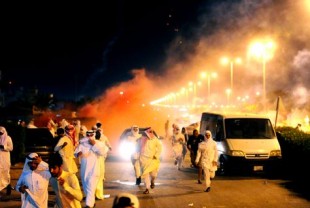

Kuwait sees protest against new parliament

Tens of thousands of Kuwaitis marched in the capital on Saturday in peaceful protest against a parliament elected last week in the Gulf Arab state under voting rules deemed unfair by the opposition.
Rule changes passed by decree in October, which reduced the number of votes per citizen to one from four, have prompted a spate of demonstrations and led the opposition to boycott the Dec. 1 election.
The government, in which members of the ruling family hold top posts, says the new rules bring Kuwait in line with democratic norms elsewhere. The opposition, which includes Islamist and populist politicians, says they were designed to skew elections in favour of pro-government candidates.
Crowds of men, women and children wearing orange, the colour of the protest movement, marched along a coast road on the edge of the capital, heading for Kuwait Towers, a major landmark by the Gulf.
Holding Kuwaiti and orange flags, they chanted: "The people want to bring down the decree!" They sang and clapped, giving the march a festive feel as a police helicopter circled above.
Years of political turmoil have held up investment and economic reforms in Kuwait, a US ally and OPEC member state which has held four parliamentary elections since 2006.
The protesters say they want wider political reforms but not an Arab Spring-style revolution.
"We reject the last election because of the one vote system, because most of the people did not participate. We want the four-vote system back and new elections," said 21-year-old student Saad al-Zobi.
Ruler Sheikh Sabah al-Ahmad al-Sabah has said his amendments will help preserve national security and stability.
Under the old system, politicians could urge supporters to cast additional ballots for like-minded candidates - a way to build informal alliances in a country where parties are banned.
"We - the people - should be consulted when there are any big changes," Nadja Saleh, a 45-year-old bank worker said, gesturing at the crowd. Slogans carried on large orange banners included "Justice, liberty and equality" and "Dictatorship is destructive, democracy is constructive."
Police had put up some barricades along the march route but their presence appeared light. Other recent marches, which authorities said were unlicensed, have been broken up using tear gas and smoke bombs.
The new parliament is expected to be more government-friendly than its predecessor, elected in February. The opposition held a majority in the last assembly and put pressure on the cabinet, forcing two ministers out of office.
Kuwait has the most open political system among the Gulf Arab states. Parliament has legislative powers and the right to question ministers. But the emir, head of the Al-Sabah family that has ruled Kuwait for 250 years, appoints the prime minister, who chooses the cabinet.
The government says opposition lawmakers have used parliament to settle scores rather than pass laws to develop the economy. Opposition politicians accuse the government of mismanagement and have called for an elected cabinet.